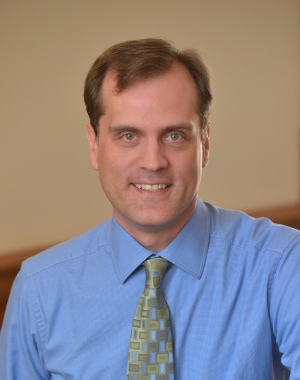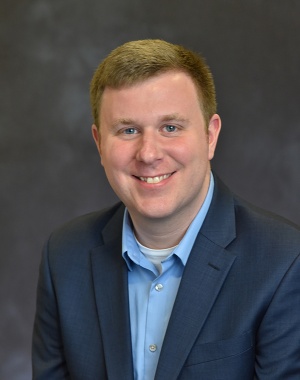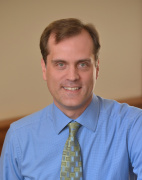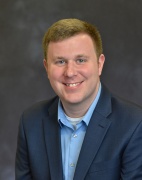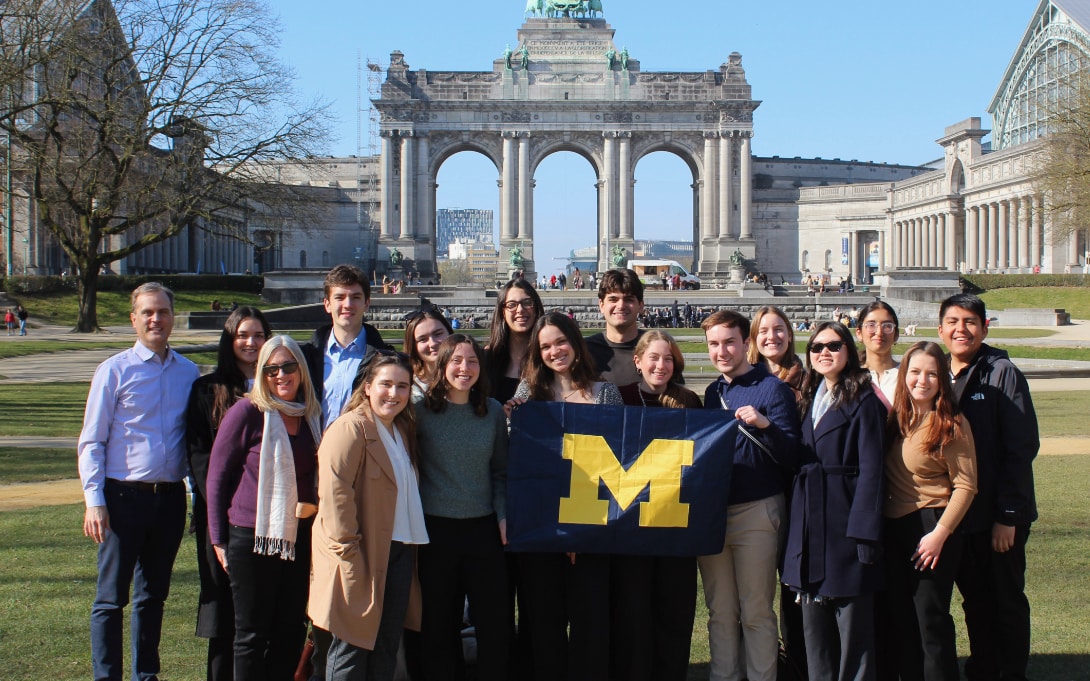
When 15 public policy undergraduates touched down in Brussels, Belgium in March, they knew they were visiting Europe’s capital at a pivotal moment.
“Our trip to Brussels came at a time of great uncertainty about the future of the transatlantic relationship. European countries are facing fundamental questions about U.S. security assurances at a time when Russian threats in the east are growing,” said Ford School Lecturer Jonathan Hanson, who led this year’s “PubPol 480: Global Engagement Seminar.” This year, the annual travel course—organized by the Ford School’s International Policy Center—focused on European politics and culminated in a week-long study tour to Brussels over spring break. Professor Paula Lantz also traveled with the group.
During the first half of the semester in Ann Arbor, the students split into three groups, each focused on a different policy topic: migration, climate change, and regional security. Once in Brussels, they applied what they learned in the classroom by asking key questions in the very buildings where European policy is made. “Being able to study European politics and the policymaking process, and to apply it at high-level meetings with places like the Commission, Parliament, and NATO, made this a once-in-a-lifetime opportunity,” said Joshua Crook (BA ‘26).
Over five days, students met with representatives from NATO, various European Union bodies, and multiple think tanks. For Emma Scott (BA ‘26), it was an opportunity to engage with the people actively working on the most important policy challenges that Europe is currently facing. “It was a really cool experience to meet with so many influential policy makers and researchers and have the chance to discuss real-life issues and policy options,” she said.
Many students were surprised by the striking similarities they observed between the issues they were learning about in Europe and those they see at home. “The EU and the U.S. are both grappling with a deeply divided political landscape, which has made it increasingly difficult to find common ground on how to effectively address issues like migration. In both contexts, leaders have used migration as a political tool, further complicating potential policy solutions,” said Julia Pelletier (BA ‘25). “Speaking with policymakers in Brussels has shown me that many of the challenges the U.S. faces transcend borders.”
Much of the discussion was shaped by recent shifts in American foreign policy, particularly in the wake of President Trump’s meeting with Ukrainian President Volodymyr Zelenskyy that occurred only two days before the trip began. As students asked the policymakers questions about their three policy areas, it became clear that Europe, like much of the rest of the world, is at a crossroads marked by uncertainty. However, some left with newfound inspiration to find solutions to critical global issues.
“Visiting Brussels reminded me that even in a time of global uncertainty, meaningful progress is still possible when people from different places and perspectives gather to confront shared challenges,” said Eric Derr (BA ‘25). “I gained renewed optimism witnessing how Europe's leaders, even amid daunting security and economic pressures, work in concert to advance meaningful climate initiatives for the common good.”
Hanson shared a similar insight from the trip, expressing hope that the crisis could drive even stronger continental cooperation. "What came through clearly from these meetings was a sense of resolve. European cooperation, though always challenging, has grown in response to crisis. The present crisis may bring an unprecedented level of coordination on defense in Europe, this time without the United States as a leading partner,” he said.
About the course
PubPol 480: "Global Engagement Seminar” is an advanced seminar for Ford School undergraduates to examine how policies are debated, formulated, and implemented at the international level and in national and regional contexts outside of the United States. In the Winter 2025 semester, the course focused on international politics in Europe, studying three policy challenges: security relations with Russia, climate change, and the European migration crisis.
The course features seven weeks of study in Ann Arbor and a one-week study tour to Brussels, Belgium over spring break. The study tour enables students to examine the issues more deeply through discussion with policy stakeholders in Brussels. Upon return to Ann Arbor, students work in their groups to complete poster presentations and policy reports.
Written by Julia Brownell (BA ‘25)
